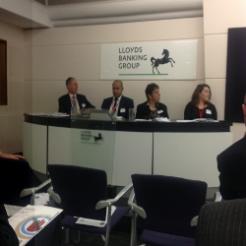The panel at today’s launch of a guide designed to help charity leaders tackle fraud stressed the sector’s need to increase its focus on the issue if it is to cut a £1.1bn loss.
Charity Fraud: A guide for the trustees and managers of charities is designed to help charities prevent, detect and report fraud and was launched at a breakfast event this morning at Lloyds TSB in London. A number of charity sector bodies including CFG, the Charity Commission and NCVO have joined together with the National Fraud Authority (NFA), the Fraud Advisory Panel and other public sector and law enforcement organisations to produce the guide.
Top tips
Following anecdotal and informative presentations, the four-person panel was invited by the meeting’s chair Caron Bradshaw, chief executive of CFG, to each give his or her ‘top tip’ to help charities fight fraud.
Edward Nkune, a director at the NFA, insisted that all fraud can be prevented if the correct measures are in place. “Apply due diligence," he advised, “and don’t be afraid to have a good look into the people you employ and who volunteer for you.”
“Never believe that it will never happen to you – just because it never has, doesn’t mean it never could!” came the warning of Rosalind Wright, chair of the Fraud Advisory Panel.
Michelle Russell, head of investigations and enforcement at the Charity Commission, told the room that blank cheque writing still goes on in the sector, and must be stamped out. “Know exactly what to do in the event that something does happen,” she further advised, emphasising the need for fraud prevention measures to be established and put in place.
Neville Kyrke-Smith, national director of Aid to the Church in Need UK, summarised the whole panel’s thoughts with: “Be vigilant and show integrity.”
Bradshaw had her own top tip: “The voluntary sector should drive the anti-fraud agenda – not be a passenger.”
The charity fraud project
The public, government, law enforcement, the wider public sector, private sector organisations and the voluntary sector have entered into a partnership to form Fighting Fraud Together (FFT). Under the remit of FFT, the NFA and Charity Commission have instigated the charity fraud project, a strategy aimed at reducing fraud within the charity sector. Charity Fraud: A guide for the trustees and managers of charities is one of the outputs of that project and was co-ordinated by CFG.
The NFA’s Annual Fraud Indicator (AFI) found that charities estimate they lose 1.7 per cent of their annual income to fraud – equal to around £1.1bn of the sector’s income.
The full list of the 15 public, law enforcement and charity sector organsations making up the charity fraud project is: Acevo, ACF, Acre, the Charity Commission, CFG, City of London Police, Community Matters, Fraud Advisory Panel, HMRC, ICAEW, Institute of Fundraising, National Fraud Authority, NCVO, Small Charities Coalition and Charity Trustee Networks and SOCA.
Also launched at today’s meeting was a guide for donors produced by the Fraud Advisory Panel, entitled Giving Safely: A guide to making sure your charitable donations really count.








